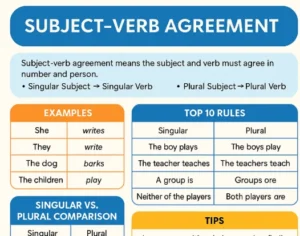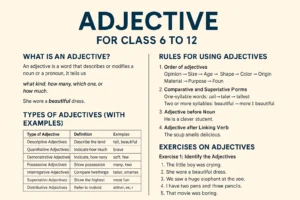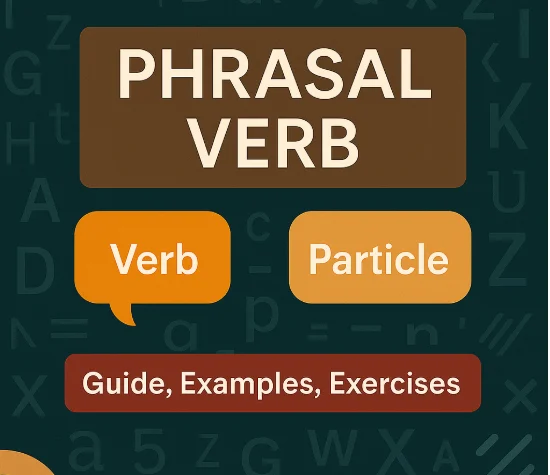Phrasal Verbs in English Grammar: Definitions, Exercises Examples, Types, and Practice Test
Select Your Practice Test- Choose Your Difficult Level
Easy – Class 6 & Class 7 – Intermediate – Class 7 & Class 8 & Class 9 – HARD – Class 10 , CLASS 11- 12
MCQ Test, Self Assessment
| Chapter | Test Type |
|---|---|
| Easy | |
| Intermediate | |
| Hard |
Introduction to Phrasal Verbs
Phrasal verbs are a combination of a verb + preposition/adverb or both, that together create a new meaning different from the original verb. They are commonly used in spoken and written English, especially in informal contexts.
Example: “give up” (meaning: to quit) is different from “give”.
Why Are Phrasal Verbs Important?
- They enhance fluency and naturalness in English.
- Frequently appear in everyday conversation, idioms, and informal writing.
- Often tested in competitive exams and grammar assessments.
Structure of Phrasal Verbs
| Verb | Preposition/Adverb | Phrasal Verb | Meaning |
|---|---|---|---|
| bring | up | bring up | to mention a topic |
| look | after | look after | to take care of |
| give | in | give in | to surrender |
| take | off | take off | to remove / to ascend |
Types of Phrasal Verbs
1. Transitive Phrasal Verbs (Take an object)
Example: She called off the meeting.
2. Intransitive Phrasal Verbs (Do not take an object)
Example: The plane took off.
3. Separable Phrasal Verbs
Example: He put off the meeting / He put the meeting off.
4. Inseparable Phrasal Verbs
Example: She looked after the child. (Cannot say: She looked the child after.)
Common Phrasal Verbs with Examples
| Phrasal Verb | Meaning | Example |
| break down | to stop functioning | The car broke down on the highway. |
| bring up | to raise a topic | He brought up the issue in the meeting. |
| call off | to cancel | They called off the match. |
| find out | to discover | I found out the truth yesterday. |
| get along with | to be friendly | She gets along with her coworkers. |
| look into | to investigate | The police will look into the matter. |
| take over | to assume control | She will take over the project. |
| turn down | to reject | He turned down the offer. |
Phrasal Verbs vs Regular Verbs: Comparison Table
| Regular Verb | Phrasal Verb Equivalent | Usage Example |
| cancel | call off | They called off the meeting. |
| investigate | look into | I will look into the complaint. |
| reject | turn down | She turned down the proposal. |
| continue | carry on | Let’s carry on with the lesson. |
Exercises on Phrasal Verbs
Exercise 1: Fill in the Blanks
Choose the correct phrasal verb from the brackets.
- The teacher asked us to _______ our essays by Monday. (hand in / hand over)
- We had to _______ our vacation due to bad weather. (call off / call out)
- Please _______ the lights before leaving. (turn off / put off)
Answers:
- hand in
- call off
- turn off
Exercise 2: Spot the Error
Find and correct the error:
- He broke into tears when he hearing the bad news.
- I looked the word up in the dictionary.
Answers:
- Error: hearing → heard
- Correct as is: “I looked the word up in the dictionary.” (Separable)
Exercise 3: Match the Columns
Match the phrasal verbs to their meanings:
| A | B |
| 1. give up | a. investigate |
| 2. look into | b. cancel |
| 3. call off | c. quit |
Answers: 1-c, 2-a, 3-b
Exercise 4: Cloze Passage
Fill in the blanks using appropriate phrasal verbs:
When the fire alarm rang, everyone had to _______ the building quickly. The manager tried to _______ the situation, but the crowd didn’t listen. Finally, the firefighters _______ and brought the situation under control.
Options: (deal with, get out of, showed up)
Answers: get out of, deal with, showed up
Tips to Master Phrasal Verbs
- Learn in context – Read stories or dialogues.
- Group by verb – e.g., “get up”, “get over”, “get through”.
- Practice regularly – Use flashcards or quizzes.
- Use in writing and speaking – Apply what you learn.
Conclusion
Phrasal verbs are essential for understanding and expressing everyday ideas more naturally in English. Mastering them requires practice, contextual usage, and gradual learning.
“The more phrasal verbs you know, the more confident and fluent you become.”


